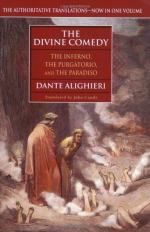|
|
The Inferno Canto XXXIV
In the fourth round of Hell, named Judecca after the famous betrayer Judas, Dante and Virgil see a great pair of wings mowing the air and sending out thick breaths of air. "Vexilla Regis prodeunt inferni towards us." Canto XXXIV, pg. 181 In this ring, the center and nadir of Hell, are punished those who betrayed their lords or benefactors. The souls here are completely emerged in ice, but they pass them and head directly to impossibly massive form of Satan. His size is not comparable even to the giants. He is only frozen to mid breast so much of his hideous aspect can be seen clearly by Dante who because of fear feels neither dead nor alive. Satan has three faces: one red, one yellow, and one black. Two enormous bat-like wings immerge from under each of his faces and beat together creating three currents of freezing wind. Tears and bloody foam drip off each of his three chins and in each of his three mouths, he chews a traitor. Judas Iscariot is one of these sinners. His head is inside the red mouth and Satan's teeth tear the skin from his back. Brutus, who betrayed Cæsar, writhes in the mouth of the black face, and his partner, Cassius, in the yellow. Virgil tells Dante they must move on and carries him through Satan's wings and down his back. At one point Virgil turns round and appears to climb back up, but they come out in what seems like the dark corridor of a prison. Satan's legs are imbedded in the floor. Dante is disoriented, but Virgil explains that they have come to the other side of the center of the earth, and what was up is now down and where there night was beginning, here day rises. Virgil says Satan fell from heaven headfirst down into the earth on this side. He suggests that the vast well of Hell is actually the earth fleeing Satan's vile form and that the mountain of Purgatory, which they will ascend towards on this side, is another such natural repulsion. They follow the path of the river Lethe that flows down from Purgatory, and see "through a round opening the beauteous things which Heaven bears; and thence issu[ing] out, again to see the Stars." Canto XXXIV, pg. 184



